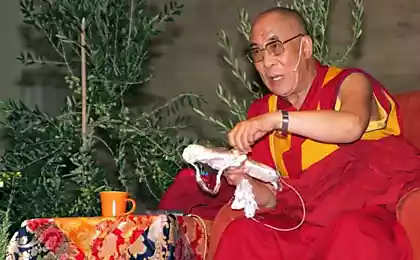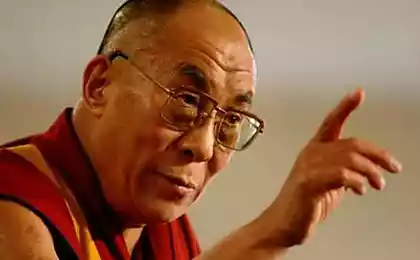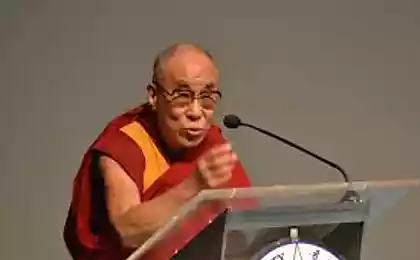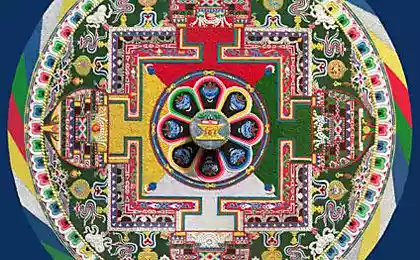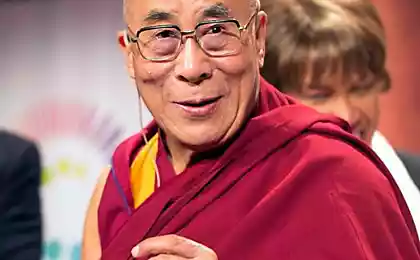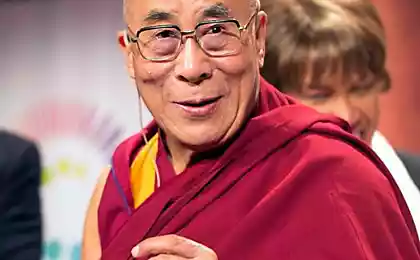1473
The Dalai Lama for the convergence of science and spirituality
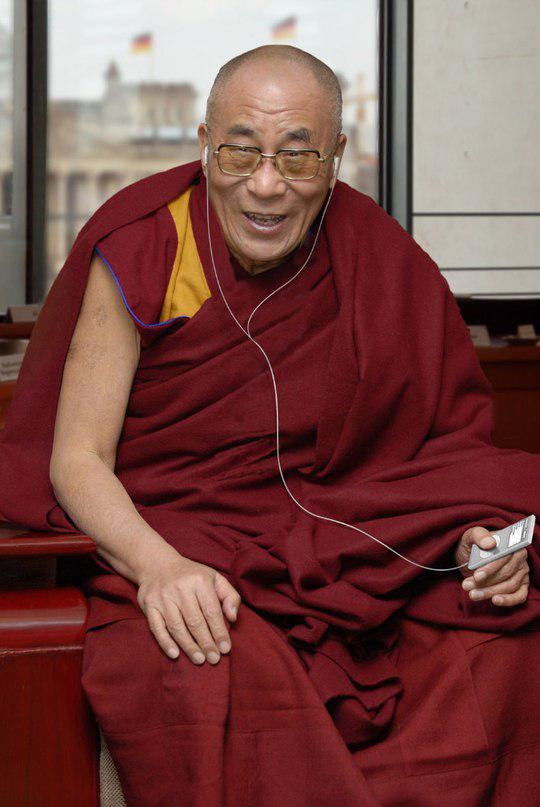
When Tuesday, the Dalai Lama was raised at the stage of the Hall of the Constitution of the headquarters of the DAR (women's NGO "Daughters of the American Revolution"), he looked more a peasant, who is a native than the international idol, which is worshiped by millions of people as the incarnation of the Buddha of compassion 74 Avalokiteshvara.
Dalai Lama
He walked slowly, leaning slightly forward, with a broad smile on his face and with a sly twinkle in his eye. Why not: thousands audience - scientists, people involved in meditation seeking spiritual knowledge, monks in red robes - gathered to listen to the teaching that the Dalai Lama himself is studying early childhood. He first studied at the Tibetan religious teachers, and now for almost twenty years, the Dalai Lama is actively seeking to expand their knowledge in various fields of science. At his residence in the mountains of northern India attracts scientists from around the world to discuss with him his last work.
The meeting on Tuesday was the second public meeting with the Dalai Lama scholars. She came in a homely atmosphere, as if the thousandth audience watched the conversation flowing in the living room of the Dalai Lama. Relying on the chair, the septuagenarian Dalai Lama, who is also called His Holiness told that a young boy living in a remote and then completely inaccessible to outsiders Lhasa, fond of technology and science. Later this passion has resulted in elevated and often complex, scientists and philosophical discussions.
"After these discussions, I often find it difficult to remember what exactly was said," - he says with humility, which seems an exaggeration to those who are familiar with the writings of the Dalai Lama. "But I think that these conversations leave an imprint in my brain».
Just how deep this imprint, was the theme of a surprisingly heated discussion during nyneshnego10-day visit of the Dalai Lama to Washington. The Dalai Lama is already a prominent figure in religion, politics and literature. However, its growing influence in the scientific community for the first time encountered significant opposition.
It was not at the meeting in the Hall of the Constitution, sponsored by the Mind and Life Institute, founded with the participation of the Dalai Lama. Officially, the topic of discussion, which will last for three days, is a meditation and a modern scientific view of the positive impact that meditation has on the human mind and body.
Rather, the problem may occur on Saturday at the annual meeting of the Society for Neuroscience, which the Dalai Lama will speak to the time the report.
American scholars of Chinese origin have started a campaign, which aims to abolish the performance of the Dalai Lama. At least 600 people have signed the petition, which states that religious leaders should not take part in the conference. Magazine «Nature» devoted to this subject editorial and printed letters of protest.
"Speech by religious leaders with controversial political views, can provoke unnecessary controversy, hype in the press, as well as a significant split in the Society for Neuroscience, whose members include scientists from different countries, with different religious beliefs and political views," - said in the petition that besides Chinese scientists have signed and hundreds of scientists and researchers who do not have to do with China.
"The fact that the Dalai Lama was invited to deliver a lecture on" Neuroscience aspects of meditation "in front of more than twenty thousand collection of respected scientists contrary to common scientific sense. The topic will be presented biased, not from a strictly scientific standpoint and without reinforcements scientific evidence ».
This statement immediately provoked a backlash supporters speeches of the Dalai Lama, and has given rise to discussions about the real motives of the authors of the petition. For half a century between China and Tibet independence once there are more than a strained relationship, and the Dalai Lama is in the heart of the conflict.
"Wherever arrived on an official visit of the Dalai Lama, the Chinese are certainly to protest about this," - says John Ekerli, president of the International Campaign for Tibet and one of the sponsors of the Dalai Lama's visit to Washington. According Ekerli, the Saturday performance is just one of a series of "dialogue between neuroscience and society." So, next year a report on the meeting of the Society for Neuroscience will present renowned architect Frank Geary.
Secretary of the Society for Neuroscience, Carol Barnes explained that "the Dalai Lama is very interested in science for a long time and more than 15 years and regularly meets with leading neuroscientists in the world. It is for this reason that he was invited to make a presentation ».
Answering journalists' questions before the conference in the Mind and Life Institute on Tuesday, the Dalai Lama said he understood the reason for disagreement: "When people found out that I will be performing with the report, they thought - the Dalai Lama, a symbol than 500 years of Tibetan Buddhism, met with scientists. I agree, it looks a little strange. But when the scientists come to our monasteries, it also does not look quite usual ».
At the conference on Tuesday, the Dalai Lama sat on stage with the other speakers. Unlike regular guests of the conference the Dalai Lama does not need to wear a name tag to be recognized. He - at the same time religious leader, student visitor, celebrity exile.
On Wednesday, Adam Engle, president of the Institute of the mind and life, has announced that the afternoon session will start later, as the Dalai Lama's scheduled meeting with President Bush and Secretary of State Condoleezza Rice. Gathered news cheered - Dalai Lama's visit to the White House undoubtedly will be useful in resolving the issue of Tibet.
In the recently published book "The Universe in the atom: the convergence of science and spirituality," the Dalai Lama shows that the objectives, methods and findings of modern science and Buddhism are surprisingly similar. At the same time, however, he is firmly convinced that the world can not be seen only from a materialist position. In his review of the book, the newspaper «New York Times» exposed quite sharply criticized some thoughts of the Dalai Lama on the boundedness of the theory of evolution in regard to the origin of life and consciousness. The review notes that the Dalai Lama offers a Buddhist version of creation.
At a meeting on Tuesday just demonstrated some parallels between Buddhist philosophy and modern science.
Wolf Singer, director of the Institute for Brain Research Max Planck in Frankfurt, said his research showed that neural coordination in the brain is fundamental to human activity and how he perceives the world, - a conclusion to which the Buddhist philosophy intuitively came already long.
Richard Davidson, a scientist and psychologist from the University of Wisconsin, whose pioneering work of meditation is also criticized by the authors of the petition (it should be noted that this work has received positive reviews in the scientific community), spoke about his research that shows how "malleable" brain and meditation changes the nature and intensity of brain waves. Robert Sapolsky of Stanford familiarized the participants with the results of the harmful effects of stress on physical and mental health. Experiments on laboratory rats showed that individuals who were given the possibility to reduce the level of stress experienced fewer health problems.
By the end of the day, it became clear why the Dalai Lama so attracted research. The discussion centered on scientists and their work being conducted with the support of the Institute of the mind and life, is how to use the latest findings in the field of biology, chemistry and psychology can understand and relieve some types of human suffering. Not surprisingly, these works are interested in a man who is considered the incarnation of the Buddha of compassion.
Assistants to the Dalai Lama say that scientific activity is not less important to him than the religious and political. On a background of confrontation of scientific and religious thought, which often can be seen in the United States, the Dalai Lama's participation in research in the field of quantum physics, neurobiology of consciousness, evolution, and the physical nature of emotions, is of particular importance.
As for the Dalai Lama, he always said, and repeated it again at a conference on Tuesday that if science proves the fallacy of the Buddhist sacred books, from them you can not refuse.




